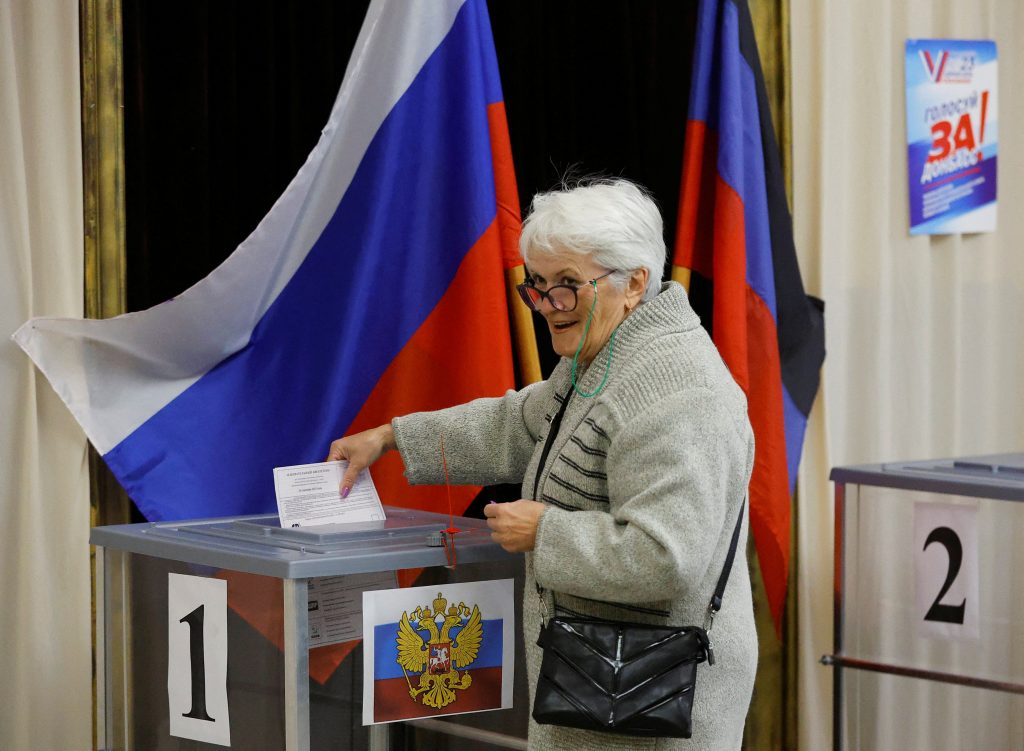By Mercedes Sapuppo, Olivia Yanchik, for UkraineAlert
In early September, Russia staged sham parliamentary elections in occupied regions of southern and eastern Ukraine as Moscow attempted to legitimize its earlier illegal annexation of five Ukrainian provinces. While the international community strongly condemned the ballots, Russian officials are expected to use the rigged elections for propaganda purposes as the Kremlin seeks to disguise its war of imperial aggression in Ukraine.
The recent sham elections in Russian-occupied parts of Ukraine’s Donetsk, Luhansk, Kherson, Zaporizhzhia, and Crimea regions took place in parallel to ballots across Russia and reflected Moscow’s efforts to portray these Ukrainian provinces as fully integrated into the Russian Federation. As Elina Beketova, a Ukrainian fellow with the Democracy Fellowship program at the Center for European Policy Analysis, explained, the Kremlin is seeking to “legitimize the occupation” and “integrate these territories into the legal and political borders of Russia.”
Predictably, Russian dictator Vladimir Putin’s United Russia party was declared the landslide winner of the vote. This highlighted the credibility problems that undermine any elections organized by the current Russian regime. “Even Russia’s supporters understand that these are sham elections, and they will not be accepted by any democratic country,” commented Ukrainian MP Kira Rudik.
Independent Russian election-monitoring organization Golos documented hundreds of reported irregularities during the election including threats of violence, voter blocking, and vote buying. “These are not real elections,” Golos co-chair Stanislav Andreychuk stated in an interview.
In Russian occupied regions of Ukraine, evidence of vote rigging was widely documented. Images of voting stations shared by Russia’s election commission showed voters casting their votes into clear plastic ballot boxes while flanked by armed military personnel.
The international community has resoundingly rejected the elections as illegitimate. The US State Department announced that the US would “never recognize the Russian Federation’s claims to any of Ukraine’s sovereign territory,” while EU leaders declared that the “sham elections can only be considered as null and void under international law.” This echoed Kyiv’s position that the entire process was “worthless.”
This is not the first time Russia has used fake ballots as it seeks to legitimize the invasion of Ukraine. In September 2022, the Kremlin staged a series of “referendums” in occupied regions of southern and eastern Ukraine before declaring that the local population had “voted” to join Russia. Vladimir Putin then oversaw a lavish Kremlin ceremony declaring the annexation of four Ukrainian regions.
Similarly, following the Russian military takeover of Crimea in early 2014, the Kremlin staged a hastily-organized “referendum” to legitimize the illegal seizure of the Ukrainian peninsula. Unsurprisingly, referendums carried out under Russian military occupation in this manner routinely result in landslide victories for the Kremlin.
This Russian tactic is not new and predates the Putin era by many decades. It can be traced all the way back to Stalin’s 1939 and 1940 efforts to subjugate the civilian population in eastern Poland and the Baltic states by staging sham votes following military occupation by the Red Army. During that period, Stalin’s Soviet forces secured control over these countries before carrying out rigged ballots, resulting in more than 90% support for Kremlin-backed candidates.
At present, there is little sign that these latest sham elections will succeed in changing international attitudes toward the Russian invasion and occupation of Ukraine. However, while virtually no outside observers appear ready to recognize the votes as credible expressions of public opinion, there is a danger that some supporters of a compromise peace settlement may eventually seek to use the ballots in order to claim that Russia does enjoy a degree of local support among the Ukrainian population.
Any attempt to legitimize the partition of Ukraine would have grave consequences for the future of international security. Instead, Ukraine’s partners must continue to demonstrate that they reject Russia’s sham elections and will never allow the normalization of imperial aggression in the heart of Europe.
By Mercedes Sapuppo, Olivia Yanchik, for UkraineAlert
Mercedes Sapuppo is a program assistant at the Atlantic Council’s Eurasia Center. Olivia Yanchik is a program assistant at the Atlantic Council’s Eurasia Center.





